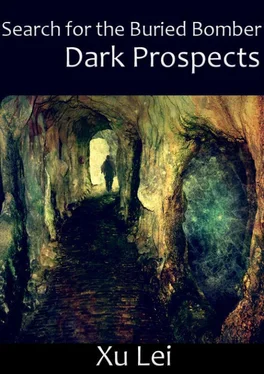We brought the ice block over to camp and set it down. The force of the fall smashed several inches off the bottom. I asked what they’d dug up. The soldiers rolled the block over so I could see. A corpse was frozen inside.
“It’s one of the goddamn invaders,” said a soldier. “We just found him, frozen to death in the ice.”
The corpse had its arms wrapped around itself, its appearance haggard. The irregular surface of the ice distorted the figure within, but I could tell he was draped with an overcoat, his body small and frail. He looked no different than a child.

CHAPTER 46

The Dead Woman
In the later stages of the war, the Japanese had been hard-pressed for troops. The final batches of soldiers sent to Inner Mongolia were all very young. The Japanese also have small builds in general, otherwise we wouldn’t call them “Little Devils.” So the height of the corpse was perhaps rather normal.
“There are a bunch more down there,” said one of the privates, “all of them hanging off the radar device. Goddamn, we were digging and digging and then from out of the ice appeared this black face. Scared the hell out of me, and I smacked myself in the head with my pickax.”
We all cracked up, but the deputy squad leader berated the soldier. “Look at your pitiful expression. How can you bear to act like such a fool? Why aren’t you getting back to work?”
This soldier was probably one of the deputy squad leader’s. At once he stopped laughing, straightened the block out, and ran back. I wanted to help out as well, but the deputy squad leader said there was no need. It was too cold out there, and they could barely endure it. Once they’d brought in all the corpses, they were coming back. They’d been forced to give up.
Very soon Old Tang returned as well. He shook the frost from his hair, whole swaths falling to the ground, then went straight to the fire, hoping to warm up. His face was cracked from the cold. Two or three more blocks of ice were carried in, then everyone filed back through the door. I could feel the temperature rise once the icehouse door was shut. “There are still several more corpses,” said Old Tang, “but we’re not going to dig them out. We’ll freeze to death if we try.”
The temperature in the icehouse must have continued to fall, although I didn’t know why. We drew close to the fire and its heat helped us regain some of our spirit. The group of young corpsmen drank cup after cup of warm tea. Some of the others crowded around the frozen corpses, looking them over with curiosity. Pei Qing was especially interested, turning over block after block. He seemed unwilling to stop until every last one of their faces was revealed. He was so tired he began raspily gasping for breath. I wondered what he was looking for. After turning one over, his face suddenly went white. At once he stopped what he was doing and squatted down.
Carrying my cup of tea over, I asked what he’d discovered. He appeared to be in disbelief. “A woman,” he said.
The young soldiers had been yakking away, but as soon as he said this, they went silent and snapped their heads in our direction. I could feel something strange in the air, a shiver of excitement that felt out of place. We looked over at them and they back at us. There was something odd and too eager about their expressions. One of them stood up and came over. Then the rest followed, until they’d all crowded around the frozen corpse.
At the time it felt rather awkward, but I later realized this was all perfectly normal. The corpsmen were young and full of vigor. They spent the whole year trekking through remote and thickly forested mountains, laying roads and building bridges. It was an arduous job, nearly impossible for women, and so any opportunity to see one was, as they say, a joy to the eyes and pleasing to the mind. Not to mention that for those of us from that generation, any female Japanese soldier was inevitably associated with Yoshiko Kawashima, the Japanese spy. The name was practically synonymous with seduction and lust. These were young guys, so even though it was only a corpse, it was still enough to make their cheeks blush and their ears turn red.
I looked over the corpse. With the warehouse still quite cold, the ice block was basically unmelted. All of the corpses were clad in similar attire, though this one was much more petite. With one glance you could tell it was a woman. Her hair was the giveaway, worn in a bun. In China, female soldiers always cut their hair short, but for Japanese female soldiers, this seemed to be the only hairstyle that existed. That was all I could make out. After looking at her for a few minutes, the engineering soldiers realized she was completely different from the image of Yoshiko Kawashima they had in their minds. Dejected, they slunk back to the fireside. Only Pei Qing continued to stare at her. I called his name. He looked up. The trace of an odd, nearly imperceptible expression flashed across his face, but then it was gone. A moment later he sighed and said, “It’s just a little girl. Those devils had no qualms at all about making her a soldier.”
“Women are never free from blame in wartime,” said Wang Sichuan, nearby. “Know how many Chinese she’s killed? What’s there to take pity on?”
Pei Qing’s face twisted, but he forced a smile. Then suddenly he turned to me. “Old Wu, help me boil some water. Let’s melt her out. I want to see what she’s got on her.”
“Huh?” I said. “What are you thinking now?”
He explained that in the Japanese military, women were generally either assigned to special units or they worked as secretaries for officers. And though they could be quite young, their military posts were often very high. He wanted to see where this woman had come from and whether she might have any documents on her that could provide us some clues.
“Boiling water isn’t going to work,” said Old Tang. “The ice is too cold.” It would only cause the ice to crack, he said, ripping apart the body inside. By the time the ice melted, the ground would be nothing but bloody water. There were too many examples of this during the Korean War. The frozen remains of many volunteer soldiers were dug out of the snowy ground and had to be melted out little by little using heated towels. I had heard about this cracking phenomenon while stationed in the Greater Khingan range. A local villager told me if you pissed on the ice during cold weather, it would split apart.
Pei Qing was forced to abandon his idea, but the factory was far from warm. Who knew how long it would be before the ice melted on its own? He asked me to help push the slab closer to the fire. I had no interest in this, but it seemed impolite to argue. As soon as I pushed, the whole thing rolled over. “Be more careful,” said Pei Qing angrily. He hastily started to turn it back over.
I frowned and felt utterly exasperated. It’s a pity at the time I didn’t give it more thought, but a moment later my attention was drawn to the figure in the ice. The girl was carrying a very large, extremely odd-looking steel backpack. It was circular and half as big as her body. My first thought was it was a metal snail shell. What sort of geological instrument is this? I wondered. Or is it some kind of land mine? I called Old Tang over to take a look.
“It’s not a land mine,” he said. “Land mines have a fuse.” He too had never seen a geological apparatus like it. The thing looked just like an iron shell. I was sure there was something odd about it. It was as if I’d seen it before. That was only a vague feeling, though, and I couldn’t recall in the slightest where or when I might have run into it.
Читать дальше














